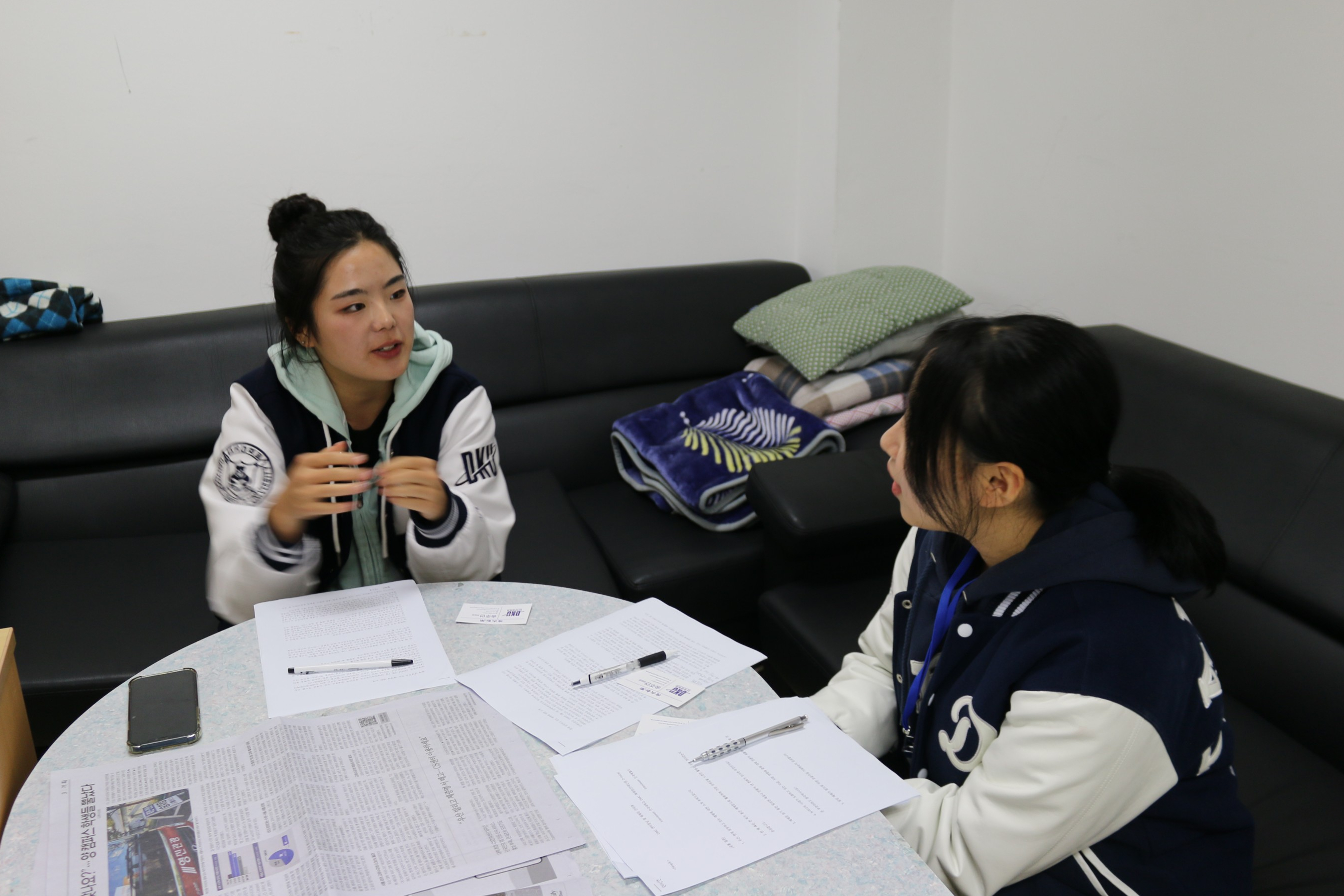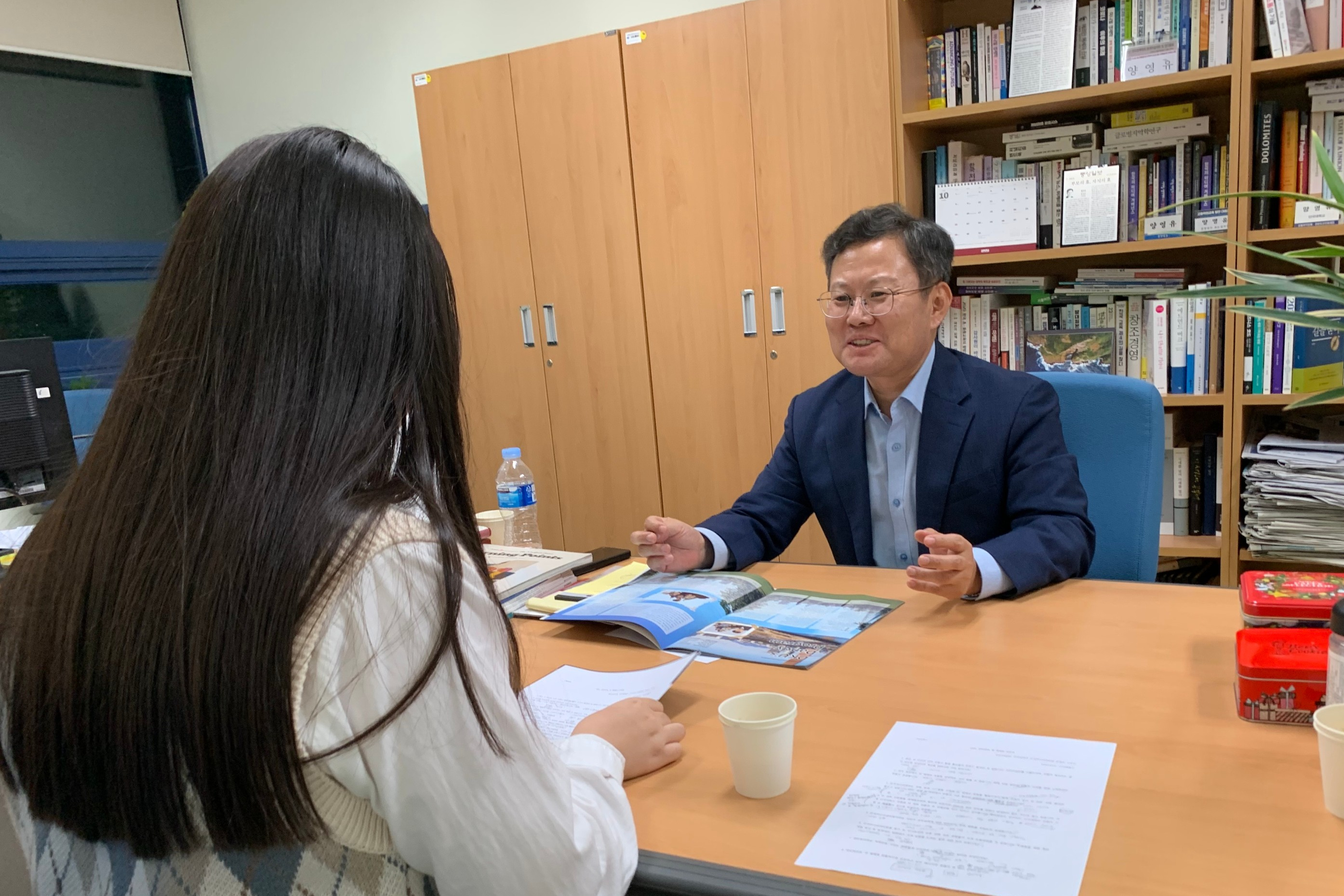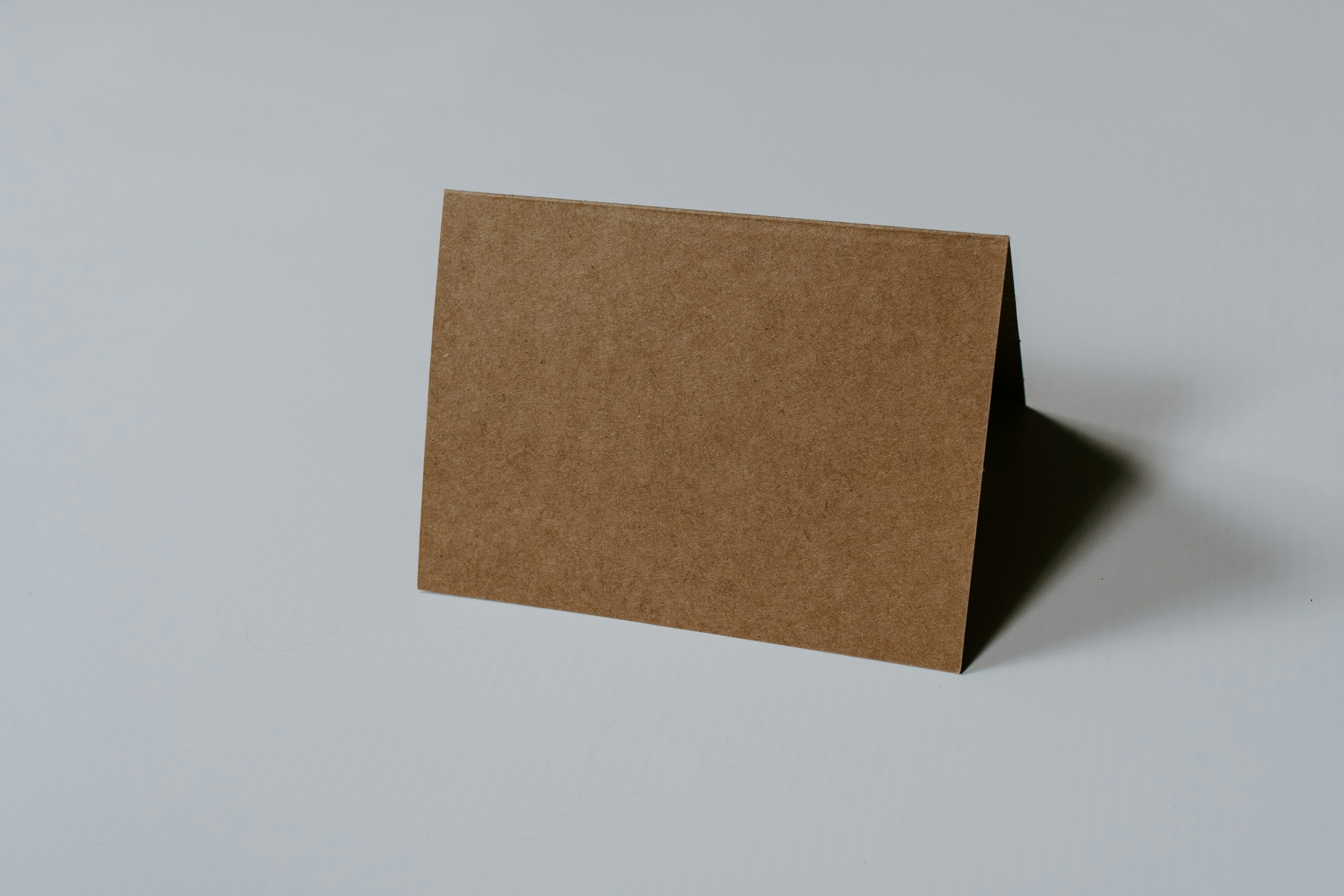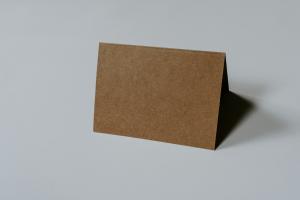Dankook University (DKU) operates the Dankook Media Center (DMC) as part of its student activities. There are five media outlets in the DMC including the Dankook Herald (DKH), the DKU Newspaper, the Dankook Broadcasting Station (DKBS), and the D-Voice. These different types of media function as communication channels that report and inform our student body of news from within and off-campus. The DKH sought to understand the visions of the future from the heads of each medium and the overall perspective from Professor Yang Young-yu, the head of the DMC. Moreover, we looked into the efforts they are making to improve information sharing for the convenience of students.
First, the DKH interviewed Song Ju-yeon, Editor-in-Chief, DKU Newspaper.
 |
| ▲ Song Ju-yeon, Editor-in-Chief, sharing her future plan and goals. (Photo from the Dankook Herald) |
Please give us a brief introduction to the DKU Newspaper.
The DKU Newspaper is one of the oldest university newspapers in the country. As a leading innovator in journalism, the DKU Newspaper publishes 12 times a year, boasting the highest number of publications among university newspapers.
What article represents your media outlet?
The ‘On-Site Reportage’ section represents the DKU Newspaper. It is a section that has a lot of pressure in terms of time, effort, and money. Nevertheless, reporters are committed to providing Dankookians (Students of DKU) with coverage of various social events and historical moments by reporting on-site. This allows reporters to vividly convey their feelings and thoughts stemming from what they are experiencing at the scene.
What activities gave you the greatest sense of accomplishment while working as Editor-in-Chief?
I can say that 'Print Day' was the most fulfilling day. It is a day when all reporters gather before the publication of the newspaper to go through copyediting. Watching the articles being completed step by step makes me want to remain a reporter forever.
Are there any goals you achieved during your term as the head of the media outlet that you wish to highlight?
I established a new breaking news team that is leading the shift towards a system of rapid and accurate reporting. Due to the nature of university newspapers, it was impossible to deliver campus news to students as quickly as other major media outlets with our existing form of publication. To address the limitations of paper reporting, the breaking news team began publishing articles online.
It seems difficult to sustain the media of newspapers in modern times. What gives you the impetus to continue your newspaper activities?
The reason why the medium of "newspapers" has survived even in its old history is that it has a tremendous attraction in itself. The reason why I can continue my newspaper activities as Editor-in-Chief is because of Dankookians who read newspapers. Also, my colleagues at the DKU Newspaper, who cover stories and work together for the newspaper, are my driving force. No matter what activity you do in any organization, you can't work alone. I am grateful to my colleagues for their burning passion for coverage, even if the work is hard.
What do you hope the DKU Newspaper will look like in the future?
I hope the 'DKU Newspaper' is loved by all Dankookians. I hope there will be love that contains advice and feedback, not just compliments. The prerequisite of love is interest in other things. In the future, I hope all Dankookians will love the Dandae Newspaper so that we will receive more attention with feedback to change and develop into a better media outlet.
Next, the DKH visited the D-Voice office on the Jukjeon Campus to interview the Editor-in-Chief of D-Voice, Oh Hye-in.
 |
| ▲ The Editor-in-Chief of D-Voice, Oh Hye-in speaking about their vision. (Photo from the Dankook Herald) |
Please give a brief introduction to the D-Voice.
D-Voice is a video-specialized media outlet founded in 2008, dedicated to delivering university news through a variety of programs and reports, serving as a communication platform for Dankookians.
As D-Voice uses video as a major medium, what do you take into consideration as compared to newspaper articles?
We are trying to capture a rich sense of realism to leverage the strengths of video media. In this regard, there is a reporting program called "Eye on the Spot" in which reporters go to a scene and directly cover it. The themes of the program usually include festivals, inauguration ceremonies of the president, and a 1,000-won breakfast project. We make every effort to ensure anyone who was not on scene gets a chance to experience the atmosphere.
What do you think the university press should value in line with social change?
I think that D-Voice is a medium that can provide great influence through new media, and we are working hard to achieve that advantage as much as possible. I guess it is significant to use various media formats to develop according to social changes. In addition, with the advent of the new media era, two-way communication between classmates has become very convenient, and the importance of this seems to have increased. If we develop our influence through social media, I think the university media outlets will be able to develop in line with social changes.
What changes have you made during your term as the head of the media outlet?
When I became the Editor-in-Chief, I wanted to change the reporting platform a lot. I wanted to make the changes to the thumbnail that is shown to the viewers. I referred to thumbnails from terrestrial broadcasters and other universities’ media to find ways to increase visibility. Additionally, there was a desire for in-depth coverage. So, I created a new reporting program called ‘Issue Plus,’ where reporters try to capture in-depth campus issues.
What activities gave you the greatest sense of accomplishment while working as Editor-in-Chief?
In September, D-Voice had an interview with the incoming university president Ahn Soon-cheol during the time of the inauguration ceremony. We learned of his blueprint for the future. As a representative for DKU, I felt it was a meaningful activity to capture the beginning of the new era for DKU through an interview with the president. As a representative of the school, it was my responsibility to convey the opinions of Dankookians, so we prepared carefully for the interview. As much as we worked hard, I felt the most accomplished because the results were satisfactory.
What do you hope the D-Voice will look like in the future?
My media aims to be a 'communication space for Dankookians'. As D-Voice aims for that slogan, I hope that it will continue to grow as a media outlet that values communication rooted in interaction with viewers.
Two of the five existing media are DKBS, and they are divided by campus. Jukjeon and Cheonan DKBS are campus broadcasting stations. Jukjeon DKBS broadcasts five days a week, while Cheonan DKBS broadcasts from Monday to Thursday. These stations cover on-campus and external information and produce video reports addressing issues that are important to Dankookians, as well as sharing useful information and empathetic stories. It is generally remarkable that these two media outlets only share similar names, but they actually produce different media. The DKH met with Director Park Hye-jin to hear the vision of Jukjeon DKBS first.
 |
| ▲ Director of Jukjeon DKBS, Park Hye-jin introducing the broadcasting festival to be held in November. (Photo from the Dankook Herald) |
Please introduce the upcoming November broadcasting festival.
It is the most important event for Jukjeon DKBS, so I have the desire to make the day a perfect one for the audience. Jukjeon DKBS has been consistently seeking feedback and conducting meetings to achieve its goals. This broadcast festival is scheduled to take place at the Humanities Hall Theater at 7 p.m. on November 17. A variety of content has been prepared for Dankookians, so please pay a lot of attention to what we have to offer.
What activities gave you the greatest sense of accomplishment while working as a director?
I remember the 'Danfesta' that took place in the first semester. We ran booths at the festival, handing out snacks and receiving song requests. Through this, we were able to promote what the DKBS does for students, and our number of SNS followers increased. I was able to get rid of the disappointment of the promotion of DKBS and the absence of the festival for several years during the pandemic and feel a sense of accomplishment.
Unlike other media, DKBS operates live broadcasts. What is the burden of this and conversely, what can you feel only through this type of communication medium?
All members always prepare a lot. It is true that everyone feels nervous during live broadcasts, but I defined this nervousness as a unique source of pride and excitement. I feel the greatest sense of relief and accomplishment when each department finishes their task without any mistakes. From the announcer's point of view, the thought that the students on the street are listening to my voice makes my heart pound.
What changes have you made during your term as the head of this media outlet?
We started a morning broadcast this semester, which Jukjeon DKBS did not do before. In addition, through a process of reorganization, we proceeded with a new format that simply plays music from 8:30 to 8:50. I'm sure many people knew that our broadcast was only on air for a segment in the day and another in the evening. Fortunately, I received good responses to the morning broadcast from students and faculty members, so it will continue.
What do you hope the Jukjeon DKBS will look like in the future?
I think Jukjeon DKBS should inspire sympathy from Dankookians. I hope it can understand the needs of listeners and become a close medium for them, like a familiar old radio station. It's not just too light, but I'm dreaming of a medium that can comfort my classmates. I'm dreaming of a medium that can comfortably engage with Dankookians, offering support without being overly burdensome or overly casual.
The DKH interviewed Director Park Ji-won in a broadcasting studio to hear the story of Cheonan DKBS.
 |
| ▲ Director of Cheonan DKBS, Park Ji-won explaining the materials used in the broadcast. (Photo from the Dankook Herald) |
Your station offers a variety of programming. What are you hoping to achieve by this?
Cheonan DKBS has created 12 different segments for morning, afternoon, and evening to enhance the diversity of its broadcasts. Staff are also more passionate when they have a segment that allows them to leverage their strengths. The most popular program is called the Dankook Talk Show, where Dankookians can participate as guests. I guess the fact that Dankookians can tell their stories to many people made it popular.
What activities gave you the greatest sense of accomplishment while working as a director?
For me, "Midnight Dankook" was the most memorable event. We planned and hosted a song contest at the festival every year. As it was DKBS' biggest event, we began preparing for it with the team during the vacation. With heavy workloads and countless conferences, we achieved our goals. Seeing both participants and viewers enjoy themselves makes me feel rewarded for those efforts.
What are the characteristics of radio broadcasts?
The most striking advantage is scarcity. Only we can handle broadcasts that go out to DKU's speakers. Since we always broadcast radio on speakers on campus, there are no students who have never heard our broadcasts, even if they don't know our name. Other than that, there seem to be more demerits. Especially these days, there are not many people who concentrate on listening to the broadcast because people don't have much time in their lives. I think this part is the most regrettable.
What changes have you made during your term as the head of the media outlet?
To compensate for the aforementioned shortcomings, a YouTube streaming channel was launched. I thought the solution would increase accessibility a little more through YouTube, which everyone uses. The biggest change is the breaking news system. Originally, most of the content, including the content topic, was decided in advance during the vacation. So, even though something new appeared in the news, we always dealt with long-lasting issues only. We started breaking news content this semester and plan to keep it going.
What do you hope the Cheonan DKBS will look like in the future?
Usually, DKBS values three things: fast and accurate reporting and a proven process. I want the members to keep the 'process' in mind. From the standpoint of production, management, and feedback, I think the most important thing for us is judgment. I look forward to a media outlet that delivers unbiased information without showing a leaning towards one side.
Following interviews with the four media heads, the DKH also had the opportunity to interview Professor Yang Young-yu, who has been leading the DMC for more than a year. The interview was conducted in the professor’s lab, where the reporters were greeted warmly.
 |
| ▲ Professor Yang Young-yu sharing his affection for DMC and goals for the media outlets. (Photo from the Dankook Herald) |
DKU's media is differentiated from other university media because of the existence of the control tower called DMC. What do you think is the biggest difference?
The biggest feature and advantage of the DMC, which is different from other universities, is the diversity of our media outlets. The presence of a control tower is rare, and it plays a crucial role in encouraging media members to actively engage in various activities. As the DMC serves as a hub for university media, I take great pride in the wide range of opportunities available to students interested in media.
How did you try to overcome conflicts that arise with the coordination of each medium?
There was nothing to call a conflict. However, I want to emphasize there is a need to manage ‘cross-media,’ which involves the harmony and exchange between each media outlet. Currently, there are five media outlets covering newspapers, broadcasting, radio, and video production under DMC. I thought there was a lack of cross-media coverage as each team seemed indifferent to each other. It also seemed difficult for Dankookians to actively seek out and engage with our media outlets. I aspire to preserve the unique characteristics of each media outlet while fostering greater empathy between the teams. An exchange between each medium is necessary for conveying both cultural and timely news. Successful interactions between media outlets should occur naturally when they meet the needs of readers rather than being forced.
What was the greatest reward you gained from any changes you made as the head of DMC?
In my school days, there was no way to have a meaningful experience like the present. Consequently, several special lectures opened after I took office and invited people who were typically difficult for students to meet. It is not common now for experts who are noteworthy in all media of DMC to share useful information with students, such as PD and photographers. Listening to their detailed stories and gaining new experiences can be a source of motivation for our staff. Therefore, it is very rewarding to be able to create a good environment for Dankookians.
What does the position 'Director of the DMC' mean to you?
It seems to be a place where I can share my experiences after working in various places, including the JoongAng Ilbo, for more than 30 years. When I was a journalist, I became a content creator myself by writing and collecting new information every day. Now, I am delivering a content creation method that fosters a view of content and provides appropriate feedback. Through this, it is possible to inject motivation and enthusiasm into DMC's reporters.
What is the ideal future of the DMC look like to you?
My ultimate goal is to create a DMC that nurtures commonly acknowledged media talent. To achieve this, I am willing to take on the role of a ‘catcher,’ similar to 'The Catcher in the Rye,' and quietly observe reporters working freely within the media. I hope DMC's media will become "the media students are eagerly anticipating." I will make various efforts to make them more appealing to listeners or readers.
DMC is a media organization at DKU that boasts a decades-long history. Through these interviews with the heads of the media and the head of the center, the efforts to build a wider readership through various media, from newspapers to broadcasting, in both Korean and English are apparent. Their continued existence is a testament to their efforts as well as the interest of readers. All members of the DMC hope you develop an interest in school media organizations as this will guarantee your continued access to new and evolving information.
김주연, 홍채연, 박상우, 정아영, 조유민, 박지윤 dankookherald@gmail.com

 Vote for the Campus Brand Naming!
Vote for the Campus Brand Naming!

![[Campus Magnifier] Let's Surf the Library!](/news/thumbnail/202404/12496_1765_4143_v150.jpg)




